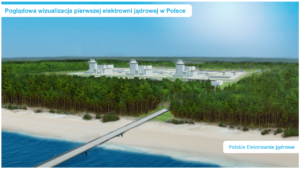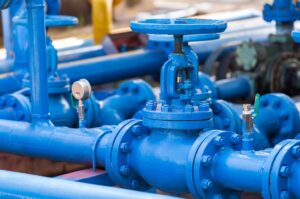The German daily Handelsblatt has published bombshell news that may decide about the future of Nord Steam 2. If it is confirmed, the gas pipeline will be in even more trouble than that caused by the coronavirus pandemic, which has already undermined its profitability – writes Wojciech Jakóbik, editor in chief at BiznesAlert.pl.
German daily’s latest breaking news
In February 2020 Handelsblatt revealed that the US may introduce new sanctions on the Nord Stream 2 gas pipeline, a controversial Russian-German project, which according to the latest declarations is to be completed at the end of 2020, or in the first quarter of 2021. The goal of the new sanctions would be to take a hit at companies that finance Nord Stream 2 in Europe. Those are Germany’s Uniper and Wintershall, Austria’s OMV, France’s Engie and the British-Dutch Shell. None of the companies own shares of the Nord Stream 2, which entirely belongs to Gazprom, but they are bankrolling half of the project. They are also hoping for gas contracts to tap into the pipeline’s 55 bcm capacity. At the end of April the companies spent another EUR 87.5 million on the project.
This piece of news published by Handelsblatt has so far not been confirmed, but new US sanctions would mean Nord Stream 2 would be at least delayed even further because Russia would have to finance the rest of the construction on its own. However, it is worth noting the money from Western Europe is in loans anyway, so Gazprom is anyway aware that it may have to finance the project on its own, but perhaps not right away.
Handelsblatt’s latest breaking news suggests that the German Federal Network Agency, Bundesnetzagentur (BNetzA), will decide against awarding Nord Stream 2 AG a derogation from the amended Gas Directive. The Russians argued that even though according to the Directive all projects completed after 23 May 2019 should be subject to the Third Energy Package, the partners in their project had incurred significant expenses even before the law went into force, which is why the possible losses caused by the new law should be prevented. In case the derogation application is rejected by BNetzA, the project shareholders will most probably go to a German court and then maybe to the European Court of Justice. Previous legal disputes over the Third Energy Package took dozens of months to resolve, so perhaps this one would take as much time, thus contributing to a longer delay of the project.
In the meantime, EU member states will be implementing the updated Gas Directive, including Poland which has forwarded the relevant act to the Senate only recently. It remains to be seen how Germany will implement the law. Berlin may want to interpret it in a way that would treat the contentious Nord Stream 2 leniently. The Handelsblatt’s bombshell news will be verified after 8 May, when the consultations on BNetzA’s decision on the derogation will end. The next stage of the possible dispute may concern the interpretation of the Gas Directive’s regulations in Russia, which may be necessary to launch gas transit via Nord Stream 2 to Europe. Currently, Gazprom is Russia’s export gas monopoly, but to fall in line with the Third Energy Package, Moscow would have to allow competition to tap into the pipe. It may turn out that Nord Stream 2 will remain empty long after it has been completed, because of a lack of decision by the European Commission, which may be delayed by interventions of entities from various member states, including Poland’s PGNiG that has already threatened NS2 with going to court.
The battle for NS2 is not over yet
Whatever the future of new US sanctions and the Gas Directive fate in Germany, NS2 will struggle with long- or short-term profitability due to the gas prices crisis and the plummeting gas demand in Europe. The pipeline’s 55 bcm annual capacity was already more than Europe needed even before the pandemic, and could only be explained by Russia trying to achieve a political goal by passing transit countries such as Belarus and Ukraine. The current drop in gas demand in Europe, exacerbated by record-high gas reserves on the continent gathered this winter because of the expect conflict between Russia and Ukraine over their transit contract, has created a situation where Europe will not need new gas before the end of the pandemic, which is estimated at 2021 assuming that a COVID-19 vaccine is developed. Ukraine has offered its stored gas for sale in Europe and Germany has already started to reduce its domestic production. Perhaps this is why Kommiersant has suggested that Nord Stream 2 may be delayed because Gazprom will actually need it in the first quarter of 2021, which is the latest date officially suggested by Moscow. This looks like ground is being prepared for another announcement about the project’s delay, this time caused by the coronavirus, followed by a suggestion that everything is according to plan.
What doesn’t kill NS2, will make it stronger?
To sum up, US sanctions and the amended Gas Directive will not kill Nord Stream 2, but may delay it, decrease its profitability and the Kremlin’s ability to use it for political gain. The coronavirus may impact the project in a short-term, but on the other hand, could be also used to the project’s advantage by Germany. Berlin may use the epidemic as an excuse to implement the Gas Directive in a way that will benefit the pipe, against which Poland’s MEP Jacek Saryusz-Wolski and other BiznesAlert.pl commentators have warned. However, even a pandemic that will last a few years will not change long-term plans about Nord Stream 2, about which we have written numerous times here. The new gas pipeline from Russia to Germany is to operate for 50 years and its owners have already suggested that they may replace the dirty fossil fuel with clean hydrogen. A longer delay doesn’t mean this plan is impossible to pull off, so the mounting short-term issues Nord Stream 2 is facing should not make its opponents, including Poland, complacent. The ship whose job is to finish the contentious investment has already reached Kaliningrad and needs only two days to arrive at the NS2 construction site near Bornholm.








